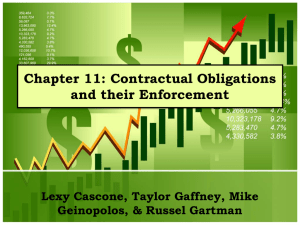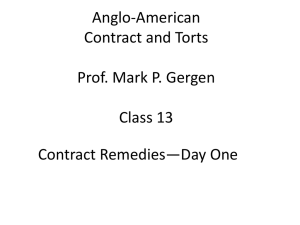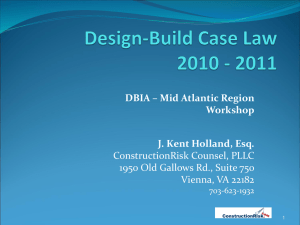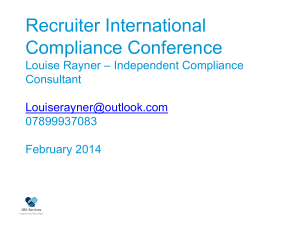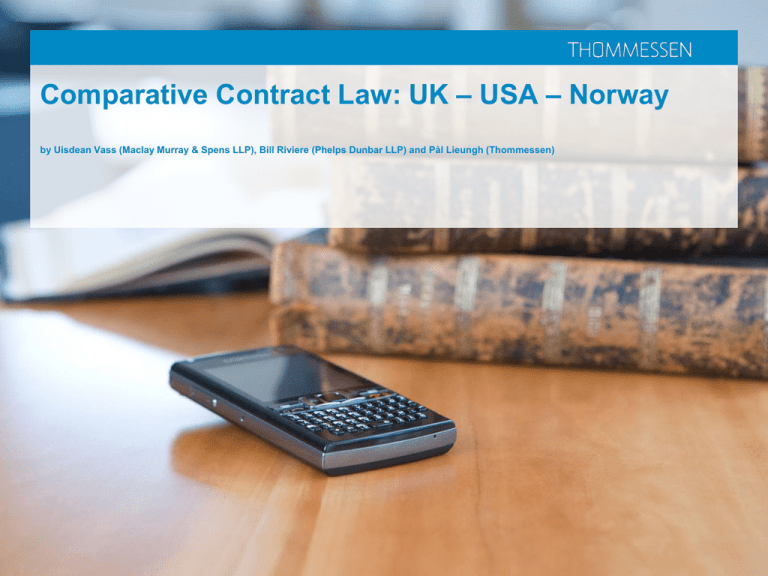
Comparative Contract Law: UK – USA – Norway
by Uisdean Vass (Maclay Murray & Spens LLP), Bill Riviere (Phelps Dunbar LLP) and Pål Lieungh (Thommessen)
Purpose:
• Based on our joint practical experience, we have identified certain material
differences between Norwegian, English and US law affecting the interpretation
of Contracts.
• We will focus on
– Construction/Supply/Engineering/Offshore Contracts
– Drafting issues
2
Structure for the presentation
• We will present separate slides for each jurisdiction: Norwegian - English - US
• The purpose is to provide practical guidance – this presentation will not be
exhaustive with repect to issues discussed
• Overall, main advice remains: Take advice from local counsel !
3
The real purpose from a
Norwegian lawyer’s
perspective (
):
but replace ”sex” with ”Anglo-
Amercian law”
4
First: What is ”US law”
• US = 50 states and US Federal law.
• There are very significant material differences which exist.
• Which states to prefer? Which states to avoid? It depends on your perspective
(which side of the contract are you on?); the subject matter and locale of the
contract/parties; and your goals/intentions. Also, it depends on your bargaining
power. Elected vs. appointed judiciary.
• State law vs. Federal law / Substantive law versus Procedural law:
– Example from contract with oil company in Houston:
• “THIS AGREEMENT SHALL BE GOVERNED BY AND INTERPRETED IN ACCORDANCE
WITH THE GENERAL MARITIME LAWS OF THE UNITED STATES, WHERE
APPLICABLE, AND WHERE NOT APPLICABLE, THE LAWS OF THE STATE OF TEXAS
SHALL APPLY, EXCLUDING IN BOTH SITUATIONS HOWEVER, ANY CHOICE-OF-LAW
RULE WHICH WOULD REQUIRE APPLICATION OF THE LAW OF ANOTHER
JURISDICTION.”
5
Then: What is ”UK law”
• UK = 3 countries (England & Wales, Northern Ireland
and Scotland)
• Wales has recently received limited law-making
powers
• The Scottish enigma
• UK law like Federal Law. NEVER have a UK choiceof-law clause.
• English law the choice of the Oil Industry
1.
General Issues with regard to the construction
of contracts
7
Rules on construction of contracts: Norwegian law
• Norwegian Law:
• ”based on objective criteria, to establish a reasonable and sensible meaning of
the provision”
– Parties to a contract are bound by an overall duty to act in good faith
– If a provision is unclear, the court will look to the pre-history of the contract, expressed
intentions, how a provision fits with the rest of the contract, its purpose and finally;
reasonableness
– In the event of ambiguity, contractual provisions are construed against the drafter
– Where issues are not explicitly addressed in the contract, background law will fill in the
gaps
– No Parol Evidence Rule; All preparatory work admissable. Will be used in the
construction of a contract, especially where the contract is unclear
– ”Entire Agreement” clause as such will not have an effect
8
Rules on construction of contracts:
English law
• “the meaning which the document would convey to a
reasonable person having all the knowledge … reasonably
available to the parties in the situation in which they were
at the time of the contract.”
• No extrinsic evidence – previous negotiations and
declarations of subjective intent.
• Primary source for understanding intent is language used
in accordance with “conventional usage”.
• Contra proferentum.
• Reasonableness – Unfair Contract Terms Act.
Rules on construction of contracts: US law (Louisiana)
• The Four Corners Rule. Determination of the common intent of the parties. Louisiana
Civil Code (“La. C.C.”) Art. 2045. When the words of a contract are clear and explicit and
lead to no absurd consequences, no further interpretation may be made in search of the
intent of the parties. La. C.C. Art. 2046.
• Ambiguity. Conversely, when (and theoretically only when) the terms of a contract are
susceptible to more than one interpretation, it is ambiguous and parol evidence may be
used to show the true intent of the parties, Thereupon, various rules of interpretation
become applicable. Words susceptible of different meanings must be interpreted as having
the meaning that best conforms to the object of the contract. La. C.C. Art. 2048. A provision
susceptible of different meanings must be interpreted with a meaning that renders it
effective, and not with one that renders it ineffective. La. C.C. Art. 2049. Each provision in a
contract must be interpreted in light of the other provisions so that each is given the
meaning suggested by the contract as a whole. La. C.C. Art. 2050.
• Ambiguity Clause: “Each party and its counsel have participated fully in the review and revision of
this Agreement. Any rule of construction to the effect that ambiguities are to be resolved against the
drafting party shall not apply in interpreting this Agreement. The language in this Agreement shall be
interpreted as to its fair meaning and not strictly for or against any party.”
10
Recitals: Norwegian law
”WHEREAS
(A) …..
”NOW THEREFORE IT IS AGREED as follows”
• ”Recitals” as such have no specific meaning under Norwegian law
• If the Recital commits one of the Parties to an undertaking or provides a right for
one Party, it will most likely be enforceable notwithstanding the fact that it is
located under ”WHEREAS” and above ”NOW THEREFORE IT IS AGREED”
11
Recitals: English law
• If not excluded by the operative part contract, the recitals
can be considered as being contractual
• If words in operative part of contract are ambiguous,
recitals can be used to clarify meaning.
• Clear words in operative part of contract govern over
recitals
• If operative part of contract silent, a contractual obligation
can arise from recitals
Recitals: US law
• Not required. Can be and often are incorporated into the body of the contract, so
as to afford the recitals contractual effect.
• Contractual undertakings, if any, expressed therein likely to be enforced in most
U.S. jurisdictions, absent ambiguity.
• Often includes definitions/defined terms that will be referenced elsewhere in the
contract, and same will be deemed to have controlling effect.
• The law of some states provide that recitals are not a part of the contract and are
not legally binding. In instances where the recitals standing alone are not legally
binding, they may be used to resolve ambiguity in the operative provisions of the
contract because they indicate the parties’ intent.
• Practice Guidance: All provisions of a contract should be carefully reviewed to
ensure internal consistency. Such review is particularly important where several
counterpart documents bear upon a particular transaction or series of
transactions.
13
Requirement for Consideration: Norwegian law
• No requirement for consideration
• A gift is enforceable
• Norwegian law does not in general recognize the concept of ”Deed”
14
Requirement for Consideration: English
law
• A definite, but very technical requirement. Consideration
need not be adequate. Peppercorns.
• A gratuitous promise made by “deed” is enforceable.
• Certain contracts must be made by deed (e.g. transferring
interest in land)
• Deeds must be formally executed – e.g. a deed executed
by an individual must be witnessed.
• Effect on limitations periods.
Requirement for Consideration: US law
• Most U.S. jurisdictions require consideration. Louisiana does not. It requires
“cause.”
• Some U.S. jurisdictions will accept a "recital of consideration" in the contract,
while others will make an underlying determination as to the validity of the recital
of consideration, if challenged.
• Some U.S. jurisdictions will consider the recital of consideration to be a
rebuttable presumption, but one that can be overcome by countervailing
evidence.
16
Consideration: Examples. Which one to use…
“WHEREAS”
“In consideration of the payment by [ ] to [ ] of the sum of United States Dollars
one (US$1), the receipt of which is hereby acknowledged, [ ] the Parties agree
as follows:”
“FOR GOOD AND VALUABLE CONSIDERATION (the receipt and sufficiency of
which are hereby acknowledged by each of the Parties) the Parties agree as
follows:”
“NOW THEREFORE IN CONSIDERATION OF THE FOREGOING AND THE
MUTUAL COVENANTS SET OUT BELOW THE PARTIES AGREE AS
FOLLOWS:”
“NOW THIS AGREEMENT WITNESSETH AS FOLLOWS:”
”NOW THEREFORE IT IS AGREED as follows:”
17
“Terms”/”Conditions”/“Warranties” /
“Representations”/ “Guarantees” : Norwegian law
– ”Terms and conditions” are synonymes
– No specific distinction between the following:
• ”A hereby warrants that”
• ”A hereby represents”
• ”A hereby warrants and represents”
• ”A hereby guarantees that”
– (Certain Consumer related legislation prohibits the use of the term ”Guarantee” unless
the ”guarantee” provides the consumer additional rights/remedies compared to
mandatory legislation)
18
“Terms”/”Conditions”/”Warranties”/
”Representations”/”Guarantees”: English
Law
• A “term” means any provision of a contract. Traditionally,
in English law, terms are either classified as “conditions” or
“warranties” but there is lack of consistency.
• Typically breach of a “condition” allows the innocent party
to terminate the contract and to claim for damages.
“Conditions precedent” “Conditions subsequent”.
• Breach of a “warranty” gives the other party only the right
to sue for damages.
“Terms”/“Conditions” / “Warranties”/“Representations”/
“Guarantees” : US law
• ”Terms” and ”Conditions” – No distinction.
• Warranty – A statement of information within the contract, the truthfulness of
which is typically deemed to be a condition precedent of, and an inducement for,
entering into the contract. A warranty is often specified to be an ongoing
obligation of one or more parties.
• Particular significance of Warranties in contracts of insurance.
• Covenant – Forward looking statement, preferred term.
• Representation - A statement by one or more parties to the contract setting
forth information, such as present condition, and which is often influential in
inducing the parties to contract.
• The failure to comply with a covenant likely will be deemed by a reviewing court
or tribunal to trigger a finding of contractual breach, and the remedies which flow
therefrom under the terms of the contract or the governing law.
• Guarantees – Not a preferred term in this context.
20
Implied terms/”Background law”
• How to construe the following contract:
• ”A shall manufacture and deliver Ex Works (Incoterms 2000) a GA 550
Generator to B by May 5, 2011 in return of payment on delivery by B of USD 5
000.”
–
–
–
–
–
–
What delay will entitle A or B to terminate?
What constitues a defect?
What are the remedies in the event of a defect?
What is the warranty period?
If the Generator doesn’t work, is B entitled to damages?
B entitled to consequential/indirect damages?
21
Implied Terms: Norwegian law
• The concept of ”Background law”; a set of rules derived from statutes, case law
and legal textbooks
– What delay will entitle A or B to terminate? ”Substantial” delay
– What constitues a defect? Conform with requirements – othwerwise fit for
purpose
– What are the remedies in the event of defects? Rectification, redelivery, reduction
in price, termination , damages
– What is the warranty period? 2 years
– If the Generator doesn’t work, is B entitled to damages? Yes
– B entitled to consequential/indirect damages? Yes – in the event of negligence
22
Implied Terms: English law
• Implied warranties are provided by the Sale of Goods Act
1979. However, in most O&G contracts, statutory
warranties are excluded.
• What delay will entitle A or B to terminate? No right to
terminate unless time is of the essence. (SOG,
Sections 51 & 54).
• What constitutes a defect? If contract is sale of goods
by description, goods must correspond with
description (SOG, Section 13). Goods must be fit-forpurpose (SOG, Section 14).
Implied Terms: English law contd.
• What are the remedies in the event of defects? Rejection
of goods. Damages.
• What is the warranty period? None implied.
• If the Generator doesn’t work, is B entitled to damages?
Yes, for violation of SOG implied terms.
• Is B entitled to consequential/indirect damages? Yes, if
these losses were in contemplation of parties on
contract execution.
Implied Terms: US law
• Implied warranties, present in each jurisdiction, will vary by state. Applicable law will
determine if can be expressly modified by the contract’s express terms.
• UCC Art. 2 (Sales) - All states (in varying form) except Louisiana.
• La. C.C. Art. 2054. No provision of the parties for a particular situation
When the parties make no provision for a particular situation, it must be assumed that they intended to
bind themselves not only to the express provisions of the contract, but also to whatever the law, equity,
or usage regards as implied in a contract of that kind or necessary for the contract to achieve its purpose.
(Equity - Based on the principles that no one is allowed to take unfair advantage of another and that no
one is allowed to enrich himself unjustly at the expense of another. Usage - A practice regularly
observed in affairs of a nature identical or similar to the object of a contract subject to interpretation.)
• La. C.C. Art. 2057. Contract interpreted in favor of obligor
In case of doubt that cannot be otherwise resolved, a contract must be interpreted against the obligee
and in favor of the obligor of a particular obligation.
Yet, if the doubt arises from lack of a necessary explanation that one party should have given, or from
negligence or fault of one party, the contract must be interpreted in a manner favorable to the other party
whether obligee or obligor.
• Redhibition (Louisiana) and other Implied Warranties discussed later.
25
Unreasonable terms and conditions: Norwegian law
• Norwegian law contains a general ”Safety valve” in the Agreement Act § 36
– An agreement may be set aside or amended by the courts ”if it will be unreasonable or
contrary to good business conduct to apply the contract”
– The treshhold for setting aside an agreement between professional parties is regarded
as very high
• § 36 is construed as including the concept that a waiver of or cap on liability or an
indemnity will not be upheld (regardless of wording) to the benefit of a party that
has acted with gross negligence or willful misconduct at mangerial level.
• ”Gross negligence” and ”willful misconduct” are legally understood terms.
Typically, these terms are not defined in contracts.
26
Unreasonable terms and conditions:
English law
• The general principle of English Law is pacta sunt
servanda. Unfair Contract Terms Act.
• With commercial contracts the only practical ”safety value”
are where provisions are against public policy.
• In civil law, there is nothing to stop a contracting party A
from agreeing to indemnify contracting party B from B’s
gross negligence or wilful misconduct. However, such an
indemnity must be clear.
Unreasonable terms and conditions: US law
• Deceptive Trade Practices Consumer Protection Acts. (Often a consumer vs.
commercial distinction.)
• Public Policy - Statutory (ex., Oilfield Anti-Indemnity Statutes) or Common Law (ex.,
Anti-Indemnity in Towage Context – The Bisso Rule).
• Implied Warranty Against Redhibition (La.) - A [hidden] defect which renders the thing
useless, or its use so inconvenient that it must be presumed that a buyer would not have
bought the thing had he known of the defect. (Rescission.) A defect is redhibitory also
when, without rendering the thing totally useless, it diminishes its usefulness or its value so
that it must be presumed that a buyer would still have bought it but for a lesser price.
(Reduction in Price.)
• Implied Warranty May Be Expressly Waived - Waiver must be: i.) be contained in the
contract of sale; ii.) be clear and unambiguous; and iii.) be brought to the buyer’s attention
or explained to him. A manufacturer provided express warranty, without more, does not
qualify as a waiver.
• Must give seller/manufacturer reasonable opportunity to repair defective product.
• Damages – Refund, Rescission, Expenses, Attorney’s Fees.
28
Definitions of ”Gross Negligence” and ”Willful
Misconduct”: Norwegian law
• Norwegian Supreme Court decision defining ”gross negligence” (Rt 1989 p
1318): ”In order for an act to be considered as grossly negligent, it must in my
opinion represent a pronounced derogation from common proper behaviour. It
must be a behaviour that is strongly blameable, where the person is substantially
more to blame than where an act is only negligent.”
• A definition of ”willful misconduct is ”an intentional/deliberate disregard of the
contract”. The intentional/deliberate disregard must cover the breach itself, but
most likely also the consequence of the breach (i.e. that the breach will result in
damage to the other party).
29
Definition of ”gross negligence” and
”wilful misconduct” under UK law
• ”Gross negligence” and ”wilful misconduct” are not legal
terms and MUST be defined.
• ”Gross Negligence” means any act or failure to act
(whether sole, joint or concurrent) in reckless disregard of
or with wanton indifference to harmful consequences such
act or failure to act would have on the safety or property of
another Person.
• ”Wilful Misconduct” means a conscious wilful act or
conscious wilful failure to act which is deliberately
committed with the intent to cause harm or injury to
Persons or property.
Definition of ”gross negligence” and ”willful misconduct”
under US law
• Gross Negligence - generally deemed to include two elements: (1) viewed objectively
from the actor’s standpoint, the act or omission must involve an extreme degree of risk,
considering the probability and magnitude of the potential harm to other, and (2) the actor
must have actual, subjective awareness of the risk involved, but nevertheless proceed in
conscious indifference to the rights, safety, or welfare of others.
• Willful Misconduct - generally described as (1) intentional performance of an act knowing
that the act likely would result in injury or damage; (2) an action taken with “reckless
disregard” of the probable consequences; or (3) a deliberate failure to discharge a duty
necessary to safety.
31
Use of capital letters/bold types for certain
provisions in a contract
• Often seen in US/English contract.
• What is the significance?
• Norwegian law: None
• English law: None
32
Use of capital letters/bold types for certain provisions in a
contract
• US law:
• Generally no significance. Note, however, some jurisdictions require
”CONSPICUOUS NOTICE” in one form or another for certain contractual
provisions (ex., indemnity provisions to be governed by Texas law, certain
consumer protection acts).
• Requirements may include use of capital letters, type-point size, bold type, etc.
• Fair Notice Requirements of Conspicuousness - something must appear on the face of the
contract to attract the attention of a reasonable person when he looks at it. (Texas).
33
The right to terminate a contract: Norwegian law
- The concept of ”material” default
• Terminology:
– Rescission is a remedy available for misrepresentation or fraud (invalidation)
– In Norwegian law, no distinction between ”termination” or ”cancellation” of a contract
– Distinction between ”ex nunc” termination (effect for unperformed obligations) and ”ex
tunc” termination (reinstatement). Consequence of termination depends on whether
restitution is feasible/reasonable
• A Contract may be terminated in the event of ”material”/”fundamental”/
”substantial” (in Norwegian ”vesentlig”) default
– Terminology: ”material”/”fundamental”/ ”substantial” will typically be translated into
”vesentlig”
– ”vesentlig” a well defined term through case law, legal text books, statutes and their
preparatory works. The test; ”is the breach of such a nature or duration/scope that it
gives the other party reasonable grounds to deem himself relieved from the contract”
(Norwegian Supreme Court Decision from 1998 (Rt 98/1510))
34
The right to terminate a contract: English
law
• Rescission is a remedy available for misrepresentation or
fraud. The purpose is to restore parties to pre-contract
situation.
• Termination for breach only operates going forward.
• The Contract will usually provide for termination on certain
breaches, usually with a right to remedy. Many oil service
contracts provide for termination at will (often requiring
payment of a premium)
• ”Material” and ”repudiatory” breach close in meaning.
• Practice Advice:
• Deal with termination in contract.
The right to terminate a contract: US law
• Material breach – Often used, generally undefined.
• Anticipatory Breach of Contract – Notice or other positive indication that party
cannot or will not perform its contractual duties.
• Time for suit? After anticipatory breach vs. after time for performance?
• Breach is generally litigated over conflicting claims of breach.
• Practice Points:
– Insert requirement of written notice of material breach clause, allowing a time period
to effect a cure, so as to preclude termination.
– Insert specific terms defining material breach, termination rights and/or termination
period.
36
How to construe the terms “Consequential
Damages/Indirect Loss” (if no definition provided):
Norwegian law
• Norwegian law:
– No distinction between the terms
– Norwegian Sales of Goods Act, §67 defines ”Indirect loss” as:
a) loss as a consequence of reduced or discontinued production or trade
b) a loss as a consequence of the goods not being utilizable as contemplated
c) loss of profit as a consequence of a contract with a third party becoming
inoperative or not being duly performed, but only to the extent that the buyer
fails without good grounds to purchase substitute goods or take other
measures to avoid or mitigate the loss,
d) loss as a consequence of damage to other property than the sold goods
themselves and objects for whose manufacture the goods are used or which
have a close and direct connection with their contemplated use”
37
How to construe the terms “Consequential
Damages/Indirect Loss” (if no definition
provided): English law
• Hadley v. Baxendale – two types of losses.
– Direct losses – naturally arising from breach.
– Indirect losses – not naturally arising but in
contemplation of parties.
• “Consequential losses” equals “Indirect
losses”
How to construe the terms “Consequential
Damages/Indirect Loss” (if no definition
provided): English law
• Thus define “Consequential loss” to cover not
only indirect losses but loss of profit, loss of
production, downtime etc when these are
DIRECT. THIS IS CRITICAL.
How to construe the terms “Consequential
Damages/Indirect Loss” (if no definition provided): US law
• Generally used interchangeably, but most often in conjunction with one another.
• Direct Losses - naturally arising from breach.
• Indirect Losses - not naturally arising, but in contemplation of the parties.
Foreseeable.
• Loss of profit could be considered by a court to be a direct or an indirect damage
flowing from opposing party’s breach.
• One party to contract may seek to exclude or insulate “time is of the essence” or
“liquidated damages for delay” provisions from a consequential damages waiver
clause, so that those other provisions are not rendered inoperative or
ambiguous/conflicting by the consequential damages waiver clause.
40
When is a contract entered into? Norwegian law
• No formal requirements (except for wills)
• A contract may be deemed to have been entered into before it has been signed,
if the parties are in agreement on all material provisions
41
When is a contract entered into? English
law
• When the parties have reached real agreement.
• Thus, if the parties have only entered into an
agreement “subject to contract” there is no
enforceable contract.
• Common in the Oil Business to make agreements
effective before the date of execution.
When is a contract entered into? US law
• Agreement on price and thing (Louisiana)
• Enforcement of an oral agreement varies by jurisdiction.
• Oral agreement binding under U.S. general maritime law.
• Transfer of certain immovable objects (ex., immovables, real estate) requires a
writing in many jurisdictions.
• Contracts exceeding a certain monetary value must be in writing in certain
jurisdictions.
• Issue of proof.
43
2.
Specific Terms used in a Contract
44
Waiver of consequential damages: Norwegian law
• Example: NF 07 Art 32.1
Company shall indemnify Contractor Group from Company Group's own indirect
losses, and Contractor shall indemnify Company Group from Contractor Group's
own indirect losses. This applies regardless of any liability, whether strict or by
negligence, in whatever form, on the part of either group and - except as stated in
Art. 17.3 and 24.2 - regardless of any other provisions of the Contract.
Indirect losses according to this provision include but are not limited to loss of
earnings, loss of profit, loss due to pollution and loss of production.
45
How short may a definition of consequential
damages be (without limiting its relevance)?
• Would the Norwegian version work?
• “Indirect losses according to this provision include but are not limited to loss of
earnings, loss of profit, loss due to pollution and loss of production.”
46
Waiver of consequential damages:
English law
• Focus on an adequate definition of consequential
damages.
• The Norwegian version would be unsafe as it
originally fails to cover ”consequential losses” which
arise as direct damages.
An English (O&G) Definition of
Consequential Losses
•
“Consequential Loss” means: the following loss or damage
howsoever caused or arising whether under contract (including
without limitation under indemnities), for breach of contract, by virtue
of any fiduciary duty, in tort or delict (including negligence) as a
consequence of breach of any duty (statutory or otherwise) or under
any other legal doctrine or principle whatsoever and whether or not
recoverable at common law or in equity and whether caused directly
or indirectly:
– (a) any loss or damage arising out of any delay in,
postponement of, interruption to or loss of production;
– (b) any loss or damage arising out of any inability to produce,
deliver or process hydrocarbons;
– (c) any loss of or anticipated loss of use, loss of profit, loss of
savings or loss of revenue;
An English (O&G) Definition of
Consequential Losses
– (d) any loss or damage incurred or liquidated or pre-estimated
damages of any kind whatsoever borne or payable, under or arising
out of or in connection with any contract for the sale, exchange,
transportation, processing, storage or other disposal of
hydrocarbons;
– (e) any losses associated with business interruption including
without limitation the cost of overheads incurred during business
interruption;
– (f) any loss of bargain, loss of agreement, loss of contract, loss of
expectation, loss of business, loss of business opportunity or loss of
opportunity;
– (g) any increased cost of working or any finance charges;
– (h) any indirect or consequential loss of any nature whatsoever; and
– (i) any other loss or anticipated loss or damage whatsoever in the
nature of or consequential upon the foregoing.
Waiver of Consequential Damages: US law
• Neither party hereto shall be responsible to the other hereunder for, and both
parties waive and release all rights against the other party and its Group for,
special, indirect, punitive or consequential damages including, but not limited to
loss of use, loss of profit, or business interruption, regardless of whether caused
in whole or part by the negligence, strict liability or other legal fault of the
released party or its Group, or the unseaworthiness or any Vessel, or any charter
breach.
50
Certain specific terms often used in English and US
contracts:
• Is there a difference between ”including” and ”including, but not limited to”?
• English law – Yes; ”including” will be construed more narrowly than ”including,
but not limited to”.
• US law – No difference. Preferred: ”including, but not limited to...” or ”including
without limitation...”
51
“time is of the essence”: Norwegian law
• Norwegian Law:
– No specific meaning as such
– May not by itself be construed as any
delay will give rise to termination rights
52
“time is of the essence”: English law
• This is important.
• It means that failure to perform a time-based
obligation will be treated as a material breach.
“time is of the essence”: US law
• Has meaning within the context of the contract.
54
”Best efforts” vs ”reasonable efforts”: Norwegian
law
– No specific difference between the
terms as such
55
“Best efforts” vs “reasonable efforts”:
English law
• There is a significant difference under English law.
• “Best efforts” requires a lot of effort but does not require
action leading to the “certain ruin of the Company or … the
utter disregard of shareholders …
• “Reasonable efforts” allows a party to balance “the weight
of its contractual obligation” against “all relevant
commercial considerations”.
• The Svalbard question.
”Best efforts” vs ”reasonable efforts”: US law
• The distinction will, again, be defined by the context.
• Often used, rarely defined.
57
”Liquidated Damages” vs ”Penalties”: Norwegian law
• ”Penalties” are enforeceable
• The use of the term ”penalty” may be construed as allowing for damages in
addition to the penalty.
• If the term ”liquidated damages” is used, this will be construed as an argument
for concluding that liquidated damages excludes additional damages for the
same breach.
58
“Liquidated Damages” vs “Penalties”:
English law
• A basic principle of contract law is that a contracting party
will be held liable only for such damages as it has actually
caused. There should be no “profit” or “punishment”
element. The other party is obligated to mitigate its loss.
• A penalty clause violates this principle, and is generally
illegal.
• Liquidated damages clauses – should be a genuine
estimate of anticipated loss.
”Liquidated Damages” vs ”Penalties”: US law
• Texas Law:
–
–
Liquidated damages provision is enforceable if (1) the harm caused by the breach is incapable of
being estimated or is difficult to estimate at the time of the agreement and (2) the amount of
damages is a reasonable forecast of just compensation.
Purpose behind a liquidated damages provision likely would be frustrated if one was allowed to
recover the anticipated losses called for in the provision plus additional damages.
• Louisiana Law:
–
–
–
–
–
La. C.C. Art. 2005. Secondary obligation: Parties may stipulate the damages to be recovered in
case of nonperformance, defective performance, or delay in performance of an obligation.
La. C.C. Art. 2007. Stipulated damages/performance: An obligee may demand either the
stipulated damages or performance of the principal obligation, but he may not demand both
unless the damages have been stipulated for mere delay.
La. C.C. Art. 2008. Failure to perform justified: An obligor whose failure to perform the principal
obligation is justified by a valid excuse is also relieved of liability for stipulated damages.
La. C.C. Art. 2009. Obligee not bound to prove damage: An obligee who avails himself of a
stipulated damages clause need not prove the actual damage caused by the obligor's
nonperformance, defective performance, or delay in performance.
La. C.C. Art. 2012. Stipulated damages may not be modified: Stipulated damages may not be
modified by the court unless they are so manifestly unreasonable as to be contrary to
public policy.
60
”Liquidated Damages” vs ”Penalties”: US law
• Washington Law:
– Liquidated damages clauses are upheld if the amount fixed is a reasonable forecast of just
compensation caused by a breach, and the harm is incapable of ascertainment or very difficult to
ascertain. The reasonableness of a liquidated damages forecast is made prospectively, as of the
time the contract was entered.
– Where several acts to be performed or omitted under a contract widely vary in importance,
the stipulation for the payment of the same amount as damages for performance or
nonperformance of each must be construed as a penalty.
– A liquidated damage for delay in project completion becomes a penalty after the owner has the
substantial benefit of the project.
• Example: ECONOMIC DISINCENTIVE FOR LATE COMPLETION OF WORK. CONTRACTOR and the
OWNER agree that time is of the essence of this Contract. The CONTRACTOR and the OWNER agree
that the Agreement is based on completion of the Work by CONTRACTOR in the time specified in the
CONTRACT DOCUMENTS. CONTRACTOR and the OWNER agree that for each and every calendar
day the work or any portion thereof shall remain uncompleted after the expiration of the time limit set in
the Contract, or as extended in writing under any provision for extension of time in this Contract,
CONTRACTOR shall be liable to OWNER for an economic disincentive pursuant to Section 49.271 (e) of
the Texas Water Code, in the amount of $500 for such calendar day. The OWNER shall have the option
to deduct and withhold said amount from any monies that the OWNER owes the CONTRACTOR or to
recover such amount from the CONTRACTOR or the Sureties on the CONTRACTOR’s bond.
”Fit for purpose”. Should the designer/manufacturer
avoid the term? Norwegian law.
• Used in legislation (The Purchase Act § 17)
• In general, the use of the term does not have any significant meaning.
62
”Fit for purpose”. Should the
designer/manufacturer avoid the term?
English law
• This is a statutory warranty under the Sale of Goods Act.
• Suggestion: the designer/manufacturer should exclude
such statutory warranties as it is hard to know all the
possible uses of a product.
• Instead, the designer/manufacturer should perform
according to a contractually agreed specification.
”Fit for purpose”. Should the designer/manufacturer avoid
the term? US law
• May be implied by law in specific jurisdictions. For example:
•
• La. C.C. Art. 2524. Thing fit for ordinary use.: The thing sold must be reasonably fit for
its ordinary use. When the seller has reason to know the particular use the buyer intends
for the thing, or the buyer's particular purpose for buying the thing, and that the buyer is
relying on the seller's skill or judgment in selecting it, the thing sold must be fit for the
buyer's intended use or for his particular purpose.
• Implied Warranty May Be Expressly Waived.
64
”Fit for purpose”. Should the designer/manufacturer avoid
the term? US law
• Uniform Commercial Code (Section 2-315). Implied Warranty: Fitness for Particular Purpose: Where the seller at
the time of contracting has reason to know any particular purpose for which the goods are required and that the buyer is
relying on the seller's skill or judgment to select or furnish suitable goods, there is, unless excluded or modified, an implied
warranty that the goods shall be fit for such purpose. This implied warranty also may be expressly waived.
•
• Express Warranties (Section 2-313): An express warranty by a seller is created as follows: (a) any affirmation of fact or
promise made by the seller to the buyer which relates to the goods and becomes part of the basis of the bargain creates
an express warranty that the goods shall conform to the affirmation or promise; (b) any description of the goods which is
made part of the basis of the bargain creates an express warranty that the goods shall conform to the description; or (c)
any sample or model which is made part of the basis of the bargain creates an express warranty that the whole of the
goods shall conform to the sample or model.
• Implied Warranties (Sections 2-314 and 2-315): There are two types of implied warranties under Article 2:
• (i) Merchantability and (ii) Fitness for a Particular Purpose.
•
Merchantability: Merchantable goods must (a) pass without objection in the trade under the contract description; (b)
in the case of fungible goods, be of fair average quality within the description; (c) be fit for the ordinary purposes for which
such goods are used; (d) run, within the variations permitted by the agreement, of even kind, quality and quantity within
each unit and among all units involved; (e) be adequately contained, packaged, and labeled as the agreement may
require; and (f) conform to the promises or affirmations of fact made on the container or label, if any. The seller of such
goods must be a merchant for such warranty to apply.
•
Fitness for a Particular Purpose: Where the seller at the time of contracting has reason to know any particular
purpose for which the goods are required and that the buyer is relying on the seller's skill or judgment to select or furnish
suitable goods, there is, unless excluded or modified, an implied warranty that the goods shall be fit for such purpose. The
seller need not be a merchant for such warranty to apply.
65
”Fit for purpose”. Should the designer/manufacturer avoid
the term? US law
• Warranty Disclaimers and Limitation (Section 2-316)
•
An express warranty may be waived or excluded so long as it is done reasonably. A waiver of the
implied warranty of merchantability must be conspicuous and the language (whether in writing or not)
must mention merchantability. A waiver of any implied warranty of fitness must be in writing and
conspicuous.
•
Unless the circumstances indicate otherwise, all implied warranties are excluded by expressions
like “as is”, “with all faults” or other language which in common understanding calls the buyer's attention
to the exclusion of warranties and makes plain that there is no implied warranty. When the buyer before
entering into the contract has examined the goods or the sample or model as fully as he desired or has
refused to examine the goods, there is no implied warranty with regard to defects which an examination
ought in the circumstances to have revealed to him. An implied warranty can also be excluded or
modified by course of dealing or course of performance or usage of trade.
66
Specific Performance as a remedy against breach of
contract: Norwegian law
• Sale of Goods Act § 23: Available unless ”an impediment exists which the seller
is unable to overcome, or performance would entail considerable inconvenience
or cost to the seller as to be substantially disproportinate to the buyer’s interest in
the seller’s performance”
67
Specific performance: English law
•
•
•
•
•
•
•
The court has broad discretion to award specific performance and in
exercising this discretion it takes into account factors such as:
Delay in asking for the order.
Whether the person seeking performance is prepared to perform his
side of the contract.
Whether the person against whom the order is sought would suffer
hardship in performing.
The difference between the benefit the order would give to one
party and the cost of performance to the other.
Whether any third party rights would be affected.
Whether the contract lacks adequate consideration (the rule “equity
will not assist a volunteer” applies so that specific performance will
not be ordered if the contract is for nominal consideration).
Specific Performance: US law
• Uniform Commercial Code § 2-716. Specific Performance; Buyer's Right to
Replevin: Generally specific performance may be decreed if the goods are
unique or in other proper circumstances. In a contract other than a consumer
contract, specific performance may be decreed if the parties have agreed to that
remedy. However, even if the parties agree to specific performance, specific
performance may not be decreed if the breaching party's sole remaining
contractual obligation is the payment of money (i.e., it is not a preferred remedy).
• Uniform Commercial Code § 2-719. Contractual Modification or Limitation
of Remedy: The parties to an agreement (i) may limit the application of
particular remedies, or (ii) may contract for an exclusive remedy.
69
Specific Performance: US law
• Louisiana Law:
• La. C.C. Art. 1986. Right of the obligee.
• Upon an obligor's failure to perform an obligation to deliver a thing, or not to do an act, or to
execute an instrument, the court shall grant specific performance plus damages for delay if
the obligee so demands. If specific performance is impracticable, the court may allow
damages to the obligee.
• Upon a failure to perform an obligation that has another object, such as an obligation to do,
the granting of specific performance is at the discretion of the court.
• [Under this Article, the court may permit the obligee to perform the obligation, or to have it
performed by a third person, at the obligor's expense.]
• La. C.C. Art. 1987. Right to restrain obligor. The obligor may be restrained from doing
anything in violation of an obligation not to do.
70
”in the the opinion of”/”in the sole discretion of”
• ”If in the opinion/sole discretion of the Buyer, the Goods are defective, the Seller
shall remedy to the satisfaction of the Buyer…”
• ”If in the reasonable opinion of the Buyer, the Goods are defective, the Seller
shall remedy to the reasonable satisfaction of the Buyer…”
• ”If the Goods are defective, the Seller shall remedy the defect…”
• Norwegian law: No tradition for using ”in the opinion of”/”in the sole discretion
of”. A court would most likely disregard the opinion and apply an objective test.
• English law:
• US law: ”Sole discretion” often seen; often modified during drafting stage.
71
Indemnifications in general: Norwegian law
• Enforceable with the exception of gross negligence and willful misconduct
72
Indemnifications in general: English law
• Quite acceptable but contra-proferentem very much
applies – rule of strict construction.
• No restriction against provisions indemnifying gross
negligence and even wilful misconduct, but the more
extreme the conduct, the more extreme the language
needed.
• Orbit Valve – “any claim … arising by any injury to or death
of any employee”.
• A Turtle – “loss or damage … whether the same is due to
breach of contract, negligence or any fault of the
Tugowner”.
Indemnifications in general: US law
• Indemnity for Gross Negligence:
• U.S. First Circuit: ”Red letter clause“may not limit liability on a maritime contract for gross negligence
because harm willfully inflicted or caused by gross or wanton negligence operates to invalidate an
exemption from liability.
• U.S. Fifth Circuit and its lower courts have held such provisions unenforceable as to limit-of-liability and
indemnity provisions. Under the general maritime law, a party may not contractually stipulate out of
liability for its gross negligence. Any purported waiver of liability will be inapplicable to grossly negligent
conduct.
• U.S. Eighth Circuit dicta: No circuit has allowed a party to absolve itself from higher levels of culpability,
including gross negligence or reckless.
• U.S. Ninth Circuit: A party to a maritime contract should not be permitted to shield itself from liability for
gross negligence.
• STAY TUNED!!!
74
Indemnifications: Should they be drafted in a
particular way to secure enforceability? Norwegian
law
• Example: NF 07
Contractor shall indemnify Company Group from and against any claim
concerning:
a)
personal injury to or loss of life of any employee of Contractor Group, and
b)
loss of or damage to any property of Contractor Group,
and arising out of or in connection with the Work or caused by the Contract
Object in its lifetime. This applies regardless of any form of liability, whether
strict or by negligence, in whatever form, on the part of Company Group.
• Regardless of the last sentence, it will not apply to willful misconduct (and
maybe not to gross negligence)
• Unclear whether the last sentence is necessary in order for the provision to apply
to simple negligence.
75
Indemnifications: Should they be drafted in a
particular way to secure enforceability? English law
76
Indemnifications: Should they be drafted
in a particular way to secure
enforceability? English law
• The lesson of Orbit Valve and other cases is that an
indemnity which is intended to cover negligence MUST
mention it.
• Similarly, if it is intended to cover more extreme conduct,
such as Gross Negligence or Wilful Misconduct, such
provisions should be clear.
• There is no English equivalent of the Conspicuousness
Doctrine.
Indemnifications: Should they be drafted in a particular way to
secure enforceability? US law
• Express Negligence Doctrine - The express negligence doctrine states that a
party seeking indemnity from the consequences of that party's own negligence
must express that intent in specific terms within the four corners of the contract
(Texas).
• Fair Notice Requirements of Conspicuousness Doctrine applies - Something
must appear on the face of the contract to attract the attention of a reasonable
person when he looks at it (Texas).
• The fair notice requirements are not applicable when the indemnitee establishes
that the indemnitor possessed actual notice or knowledge of the indemnity
agreement.
78
Third Party Rights: Norwegian law
• No similar statute like the English ”Contracts (Rights of Third Parties) Act 1999”
• If clearly stated, a person not party to a contract may derive and enforce rights
granted to him under a contract.
79
Third Party Rights: English law
• Contracts (Rights of Third Parties) Act 1999
• Commercial drafters do not want to give third parties rights
so the Act is always excluded.
• However, under LOGIC the right is retained to the extent
that the contract attempts to create indemnities in favour of
“Company Group” or “Contractor Group”.
Third Party Rights: US law
• La. C.C. Art. 1978. Stipulation for a third party. A contracting party may stipulate a
benefit for a third person called a third party beneficiary.
• Once the third party has manifested his intention to avail himself of the benefit, the parties
may not dissolve the contract by mutual consent without the beneficiary's agreement.
• La. C.C. Art. 1981. Rights of beneficiary and stipulator. The stipulation gives the third
party beneficiary the right to demand performance from the promisor. Also the stipulator, for
the benefit of the third party, may demand performance from the promisor.
• Contracting parties often exclude third party beneficiary status in their contract generally,
while preserving only those third party rights expressly granted therein:
– “Except as expressly provided herein…”
– For example, preservation of indemnity benefits extending to “CONTRACTOR’S
GROUP.”
81
Limitation of Liability: Norwegian law
• Typically drafted to address the liability for breach of contract
• A Limitation of Liability clause would typically not affect Contractor’s obligation to
complete the Scope of Work (i.e. if Contractor has to spend twice the Contract
Price to complete the SoW, he will not find relief under a limitation of liability
clause limiting his liablity to 100% of the Contract Price)
• NF 07 Art 32.2: ”Contractor's total liability for breach of contract, including liability
in accordance with Art. 24 (Contractor’s delay), 25 (Defects) and 26
(Termination), and regardless of whether the Contract is terminated or not, shall
be limited to 25% of the Contract Price”
82
Limitation of Liability: English law
• Logic
• ”The CONTRACTOR’s total cumulative liability to the COMPANY arising out of or
related to the performance of the CONTRACT shall be limited to the CONTRACT
PRICE.
• Provided however, that the above limitations shall not apply to any liabilities
assumed by the CONTRACTOR under clauses 16 (Tax), 18 (Patents), 21
(Insurances) and 28 (Liens) or to any indemnity given by the CONTRACTOR
under clause 20.”
• Will this limitation limit Contractor’s obligation to complete the Work, i.e. if the
cost for Contractor to complete the Work, exceeds the Contract Price, may the
Contractor refuse to complete the Work by arguing that the cap limits his liability
(with the consequence Company will have to pay additional compensation in
order for the Work to be completed)?
83
Limitation of Liability: English law
Logic
• “The CONTRACTOR’s total cumulative liability to the
COMPANY arising out of or related to the performance of
the CONTRACT shall be limited to the CONTRACT
PRICE.
• Provided however, that the above limitations shall not
apply to any liabilities assumed by the CONTRACTOR
under clauses 16 (Tax), 18 (Patents), 21 (Insurances) and
28 (Liens) or to any indemnity given by the
CONTRACTOR under clause 20.”
Limitation of Liability: English law
• Will this limitation limit Contractor’s obligation to complete
the Work, i.e. if the cost for Contractor to complete the
Work, exceeds the Contract Price, may the Contractor
refuse to complete the Work by arguing that the cap limits
his liability (with the consequence Company will have to
pay additional compensation in order for the Work to be
completed)?
• ANSWER: the Contractor can be compelled to render
performance, but the Contractor’s liability for
DAMAGES is capped. Such caps may encourage
default.
Limitation of Liability: US law
• From a contract with an oil company governing services in the US (Texas law)
• “Notwithstanding any other provision of this Contract, Contractor’s total liability
under this Contract, exclusive of obligations to indemnify in Article xx and
obligations to provide insurance in Article xx, shall not exceed one hundred
percent (100%) of the Contract Price.”
• Will this limitation limit Contractor’s obligation to complete the Work, i.e. if the
cost for Contractor to complete the Work, exceeds the Contract Price, may the
Contractor refuse to complete the Work by arguing that the cap limits his liability
(with the consequence Company will have to pay additional compensation in
order for the Work to be completed)?
86
Limitation of Liability - Disney
87
Dispute Resolution: Arbitration vs. court proceedings
• US:
– What to chose: Federal or State Court? Locale/jury pool often more important.
– Should one include a jury trial waiver? Some jurisdictions require that the waiver
be mutual.
– When to go for arbitration vs. court proceedings? Time, expense, necessity of
expertise of tribunal concerning a particular type of dispute. (i.e., construction).
– State vs. Federal Arbitration Act? A handful of U.S. states have adopted arbitration
rules substantially mirroring the Model Act. (Texas, Louisiana, Florida, Connecticut,
Illinois, for example). State acts are not preempted by Federal Arbitration Act.
– The U.S. Federal Arbitration Act is not a UNCITRAL Model Act.
• Careful drafting of the arbitration clause can eliminate most differences by incorporating
recognized arbitration rules.
88
Dispute Resolution: Arbitration vs court
proceedings
• UK:
– UK Arbitration Act is not an UNCITRAL model act
– When to go for arbitration vs court proceedings.
– Possible benefits:
• expertise of arbitrator(s)
• flexibility of procedure/hearings in private
• Enforcement under New York Convention may be easier than
enforcement of national decree
– Downsides:
• cost/joining third parties to proceedings/precedential value
US: Long Arm Statutes
• May Waive Personal Jurisdiction Specifically in the Contract:
• Example: Law and Forum. This Agreement shall be governed in all respects by the General Maritime
Law of the United States of America, where applicable, and, where not applicable, the laws of the State
of Louisiana shall apply, excluding in both situations however, any choice-of-law rule which would refer
the matter to another jurisdiction or body of governing law. The parties hereto agree that any disputes
arising with respect to this Agreement shall, if jurisdiction to hear such dispute exists, be filed and heard
in the United States District Court for the Eastern District of Louisiana in New Orleans ("Court"). The
parties also agree to waive any objections to the personal jurisdiction of that Court for purposes
of actions and disputes pertaining to this Agreement. Only in the event that subject matter
jurisdiction does not exist with said Court may the parties then submit any dispute concerning
the obligations under this Agreement to another court of competent jurisdiction.
• All states and the District of Columbia have enacted long arm statutes. Long arm statutes
generally fall into two categories. The first enumerates factual situations likely to satisfy a
”minimum contacts” test. The second type is broader and provides jurisdiction over an
individual or corporation as long as personal jurisdiction does not offend constitutional
considerations of due process.
90
US: Long Arm Statutes
• TEXAS: Texas courts may assert in personam jurisdiction over a non-resident if (1) the Texas long-arm statute
authorizes the exercise of jurisdiction, and (2) the exercise of jurisdiction is consistent with federal and state
constitutional due-process guarantees.” Moki Mac River Exped. v. Drugg, 221 S.W.3d 569, 574 (Tex. 2007).
• Under constitutional due-process analysis, personal jurisdiction is achieved when (1) the non-resident defendant
has established minimum contacts with the forum state, and (2) the assertion of jurisdiction complies with
“traditional notions of fair play and substantial justice.”
• A defendant establishes minimum contacts with a state when it “purposefully avails itself of the privilege of
conducting activities within the forum state, thus invoking the benefits and protections of its laws. The defendant’s
activities, whether they consist of direct acts within Texas or conduct outside Texas, must justify a conclusion that
the defendant could reasonably anticipate being called into a Texas court.
• A non-resident’s contacts can give rise to either specific or general jurisdiction. General jurisdiction arises when
the defendant’s contacts with the forum are continuous and systematic. Specific jurisdiction arises when (1) the
defendant purposefully avails itself of conducting activities in the forum state, and (2) the cause of action arises
from or is related to those contacts or activities. In a specific jurisdiction analysis, the focus is on the relationship
among the defendant, the forum, and the litigation.
• Under the Texas long-arm statute, the plaintiff has the initial burden to plead sufficient allegations to confer
jurisdiction. The defendant seeking to avoid being sued in Texas then has the burden to negate all potential bases
for jurisdiction pled by the plaintiff.
US: Long Arm Statutes
• LOUISIANA: A Combination Statute:
• La. Revised Statutes § 13:3201. Personal jurisdiction over non-residents:
• A. A court may exercise personal jurisdiction over a non-resident, who acts directly or by an agent, as to a cause of action
arising from any one of the following activities performed by the nonresident:
• (1) Transacting any business in this state.
• (2) Contracting to supply services or things in this state.
• (3) Causing injury or damage by an offense or quasi offense committed through an act or omission in this state.
• (4) Causing injury or damage in this state by an offense or quasi offense committed through an act or omission outside of
this state if he regularly does or solicits business, or engages in any other persistent course of conduct, or derives revenue
from goods used or consumed or services rendered in this state.
• (5) Having an interest in, using or possessing a real right on immovable property in this state.
• (6) Non-support of a child, parent, or spouse or a former spouse domiciled in this state to whom an obligation of support is
owed and with whom the nonresident formerly resided in this state.
• (7) Parentage and support of a child who was conceived by the nonresident while he resided in or was in this state.
• (8) Manufacturing of a product or component thereof which caused damage or injury in this state, if at the time of placing
the product into the stream of commerce, the manufacturer could have foreseen, realized, expected, or anticipated that
the product may eventually be found in this state by reason of its nature and the manufacturer's marketing practices.
• B. In addition to the provisions of Subsection A, a court of this state may exercise personal jurisdiction over a
nonresident on any basis consistent with the constitution of this state and of the Constitution of the United
States.
• OTHER JURISDICTIONAL MEANS: The Hague Service Convention
• Federal Rule of Civil Procedure 4(k) - Territorial Limits of Effective Service of Summons Establishes personal jurisdiction over a defendant if consistent with the United States Constitution and
laws.
Severability and Waiver clause
“If any provision or portions, or applications thereof, of this Contract are held to be
unenforceable, invalid or void by any court of competent jurisdiction, this Contract will
be deemed to be amended to modify such provision or portion thereof partially or
completely to the extent necessary to make it enforceable. If necessary, this Contract
will be deemed to be amended to delete the unenforceable, invalid or void provision or
portion thereof, in which event the validity and enforceability of the remaining
provisions, or portions, or application thereof, will not be affected thereby.
– None of the requirements of this Contract will be considered as waived by either Party
unless the same is done in writing. Further, failure by either Party to enforce any
rights will not waive those or other rights hereunder.”
• Why do you need this under US and English law?
• What is the consequence of not having such a clause)
93
Severability and Waiver: English law
• Severability: If a material provision of a contract is found
to be “unenforceable, invalid or void”, then, without this
clause, the whole contract may fall. The cited clause
allows a court “to fix” an insoluble situation.
• Waiver is an equitable doctrine which can informally
amend a contract. It is very common to exclude waiver.
Without such a clause the parties’ conduct can “amend”
the contract.
Severability and Waiver clause
• Example of amendment to conform to law: Texas Oilfield Anti-Indemnity Act – Maximum
unilateral indemnity imposed on a party; insurance required by contract.
• WAIVER:
– “None of the requirements of this Contract will be considered as waived by either Party
unless the same is done in writing. Further, failure by either Party to enforce any
rights will not waive those or other rights hereunder, nor shall any waiver of any
breach of any provision hereof by the other Party be taken or held to be a waiver by
such Party of any succeeding breach of such provision, or as a waiver of the provision
itself.”
95
Entire Contract and Amendment Clause
– “This Contract constitutes the full understanding of the Parties, and is a complete and
an exclusive statement of the terms of their agreement, and will exclusively control
and govern all Work performed for Company. All representations, offers, and
undertakings of the Parties made prior to the Effective Date hereof, whether oral or in
writing, are merged herein.
– No other contract or agreement, whether executed prior or subsequent to the
execution of this Contract, will in any way modify, amend, alter, or change any of the
terms or conditions set out herein unless such contract or agreement: (i) is executed
by persons of equal position and authority within their respective companies as those
executing the Contract; and (ii) clearly expresses the specific intention of the Parties to
amend this Contract by making specific reference thereto.
• Why do you need this under US and English law?
• What is the consequence of not having such a clause?
96
Entire Contract and Amendment Clause:
English law
• The effect of both clauses is to ensure that the document
regulating the parties’ relationship is the Contract, and not
prior or subsequent understandings.
• The only way to change the contract, in other words, is
through a formal amendment.
• Not having such a clause means that you have to rely on
the extrinsic evidence rule and that future actings of the
parties may effectively “amend” the contract.
• Importance of “Order of Precedence” clause.
Entire Contract, Amendment and Survival Clauses
– “This Contract constitutes the full understanding of the Parties, and is a complete and an exclusive statement of the
terms of their agreement, and will exclusively control and govern all Work performed for Company. All
representations, offers, and undertakings of the Parties made prior to the Effective Date hereof, whether oral or in
writing, are merged herein.”
– “No other contract or agreement, whether executed prior or subsequent to the execution of this Contract, will in any
way modify, amend, alter, or change any of the terms or conditions set out herein unless such contract or
agreement: (i) is executed by persons of equal position and authority within their respective companies as those
executing the Contract; and (ii) clearly expresses the specific intention of the Parties to amend this Contract by
making specific reference thereto.”
– ”The indemnity, insurance, audit, confidentiality and related provisions of this Agreement (as well as any other
provisions as may be identified expressly herein or which by their nature are intended to survive termination) shall
survive termination of this Agreement.”
• Why do you need this under US and English law?
• What is the consequence of not having such a clause?
US Law - Legal provisions may allow survival, depending on the nature of the nullified provision: La.
C.C.
Art. 2034. Nullity of a provision. Nullity of a provision does not render the whole contract null
unless, from the nature of the provision or the intention of the parties, it can be presumed that
the contract would not have been made without the null provision.
98
Estoppel and Waiver: English law
• Example of Estoppel: Louisiana enters into long-term oil
and gas leases with Texaco. Over the decades, Texaco
consults with Louisiana over how gas should be valued for
royalty purposes. One day Louisiana sues Texaco for
royalty underpayment. Texaco claims estoppel.
• Overlapping equitable doctrines: waiver, estoppel,
contemporaneous construction, apparent authority, laches.
• It is common to find provisions eliminating (or attempting to
eliminate) waiver, but rare to see provisions mention
estoppel.
• The equitable doctrines are very powerful. For example,
contracts can even be created by estoppel.
What to do when you ”reasonably expect litigation” in US?
• Legal Hold requirements
• Sanctions: Waiver, spoliation of evidence remedies, striking of defenses in
litigation, and, for more egregious offenses, default judgment, contempt of court
sanctions, possible obstruction of justice criminal sanctions.
100
Litigation Hold Requirements
• Purpose of Litigation Hold Letters
• The need stems from the fact that parties have to produce information and documents during discovery,
including “electronically stored information” (“ESI”). Litigation hold letters are meant to preserve
potentially relevant ESI for the duration of the litigation.
• When the Duty to Preserve Attaches
• Triggered when litigation is “reasonably anticipated.”
• “Once a party reasonably anticipates litigation, it must suspend its routine document retention/destruction
policy and put in place a ‘litigation hold’ to ensure the preservation of relevant documents.”
• Fact-specific inquiry based on good faith and reasonable evaluation of the facts and circumstances as
they are known at the time.
• Litigation is Reasonably Anticipated: Now what?
• Understand your document retention policies. Speak with the IT personnel re: system-wide backup
procedures and recycling policy.
• Speak with “key players” in the litigation in order to understand how they have stored information.
• Issue a litigation hold letter/memo early on and supplement as your understanding of the case & key
players evolves.
• Scope of the Litigation Hold Letter
• An effective litigation hold captures only information relevant to the anticipated litigation.
• Duty is limited “to preserve what [a party] knows, or reasonably should know, is relevant in the action, is
reasonably calculated to lead to the discovery of admissible evidence, is reasonably likely to be
requested during discovery and/or is the subject of a pending discovery request.”
• Keep in mind third parties, such as outsourced-service providers or storage-facility operators.
What to do when you “reasonably expect
litigation” in UK?
•
•
•
•
The situation is not as radical as in the USA.
Discovery is much more limited in the UK.
No regime of sanctions.
When you reasonably expect litigation, take steps:
– to preserve all relevant legal documents
– to preserve important related documents, such as emails
– to interview your own people who may have key testimony,
opinions etc.

